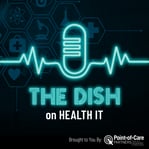Listen and Subscribe to Our Podcast
"The Dish on Health IT"
Engaging discussion around Health IT with perspectives from across the healthcare landscape. This informative and entertaining rotating panel of senior health IT consultants and their guests will keep you in the know about the latest innovations, policies and industry shifts impacting healthcare and point out the opportunities that lie within.

Subscribe on:
Apple Podcasts
Google Podcasts
Part 2, Episode #3: Health IT and the Law
Our guest, David Szabo, Co-Chair of the Health Care practice, a Partner in the Corporate and Transactional Department, and a member of the Privacy & Cybersecurity Practice Group with Locke Lord, LLP joins our regular panel of senior health IT consultants, Ken Kleinberg, Jocelyn Keegan and Gary Austin to dish on Health IT and the Law.
The panel and guest, David Szabo, continued the discussion from Part 1 by shifting the focus to the complexities of price transparency. Not only with what data is needed to provide meaningful information about the price patient's can expect to pay but to how widely this information should be expected to be shared without crossing a line to reveal contract details that companies may feel are proprietary. There has been a push by this administration to increase transparency of contract prices as well. This has been responded to in a patchwork of approaches. Ultimately, the panelists and guest agreed that the importance and impact of price transparency on patients is different in situations whether the patient is experiencing a chronic illness or an acute episode. When a patient is in the middle of an emergency shopping around for price goes out the window. Price transparency for chronic or scheduled elective procedures may be where work around meaningful price transparency will progress more quickly.
The panelists and guest then moved to discuss data privacy and patient consent. As patients begin to adopt 3rd party health apps and consent for their physicians to share their data with these 3rd party applications, data privacy no longer falls under HIPAA. Physicians may play a role in encouraging patients to carefully read privacy policies for these apps, however, physicians ultimately don't have any control over what the patient chooses to do with their data. The discussion talked about the philosophy driving these rules is the fervent belief that the more data patients have, the better decisions they will make which remains to be seen.
Data in these apps could be used by pharmaceutical companies to better track efficacy data in the real world.
Will FTC have a bigger role in enforcement/protection of health data shared with 3rd party apps? Szabo felt that congress would need to grant more powers to FTC for them to get into the role of mandating a minimum amount of protections versus their current role which is to investigate after a breach or misuse of data has already occurred.
What should payers, health IT vendors, and providers be doing? Szabo recommends that everyone get ready. Have an interoperability policy that addresses your obligations and lays out a framework for the rules and exceptions. Ken added that stakeholders should take this time to consider how their policies and long term health IT strategies will make healthcare better rather than meet the minimum regulations requirements.




